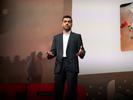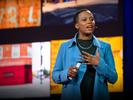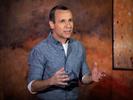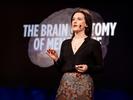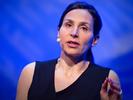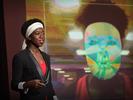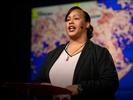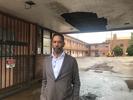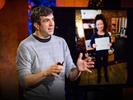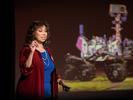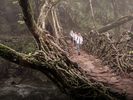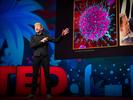NPR/TED Staff appears in the following:
Andrew Pelling: How Can Plants Help Rebuild The Human Body?
Friday, April 09, 2021
An ear made from an apple, a spinal cord rebuilt using asparagus...it sounds like bizarre science fiction. But Andrew Pelling is working on a way to revive human tissue with a trip to the supermarket.
Wajahat Ali: Can Investing In Children Revitalize Economies And Our Humanity?
Friday, April 09, 2021
In some of the world's biggest economies, people are having fewer children. But writer Wajahat Ali explains why investing in future generations is key to rejuvenating our societies...and our humanity.
Amanda Williams: How Can Color Bring New Life To Old Houses?
Friday, April 09, 2021
Back in 2015, Chicago's Englewood neighborhood was lined with blocks of houses tagged for demolition. Before they were torn down, artist Amanda Williams used color to bring them back to life.
Guy Winch: How Can We Maintain Healthy Boundaries Between Our Work And Personal Time?
Friday, April 09, 2021
Many of us are feeling weary and exhausted all the time. Psychologist Guy Winch shares ways we can both prevent and recover from the all-too-common experience of burnout.
Charlie Jane Anders: How Can Science Fiction Allow Us To Imagine Better Futures?
Friday, March 19, 2021
Science fiction author Charlie Jane Anders explains how the genre is a portal for us to imagine different ways of being human. She invites listeners into one new world with an excerpt from her work.
Rick Doblin: How Can We Use Psychedelic-Assisted Therapy To Treat Trauma?
Friday, March 19, 2021
Many psychedelic drugs are illegal in the U.S. But Rick Doblin says psychedelic-assisted therapy helps many patients get to the core of their trauma.
Ariel Waldman: What Can We Learn From Microscopic Life In Antarctica?
Friday, March 19, 2021
Many people think of Antarctica as desolate. But wildlife filmmaker Ariel Waldman says the coldest continent is brimming with invisible life — that can only be seen through microscopes.
Emily Levesque: How Have Telescopes Transformed Our Understanding Of The Universe?
Friday, March 19, 2021
Astronomers once gazed at the night sky and charted the stars using their naked eyes. Astrophysicist Emily Levesque describes how generations of telescopes have unlocked the wonders of the universe.
Lisa Mosconi: How Does Menopause Affect The Brain?
Friday, March 05, 2021
We associate menopause with the ovaries, but its symptoms start in the brain. Neuroscientist Lisa Mosconi explains how brain health during menopause affects the rest of the body.
Sandrine Thuret: How Can Adults Grow New Brain Cells?
Friday, March 05, 2021
Adults don't generate as many new neurons as children or teenagers, but some growth is still happening. Neuroscientist Sandrine Thuret explains how we can encourage the production of more nerve cells.
Kimberly Noble: How Does Family Income Affect Child Brain Development?
Friday, March 05, 2021
At birth, babies' brains look pretty similar. But by age five, there are acute disparities in development. Through a series of studies, Kimberly Noble has found one major factor is family income.
Adriana Galván: How Does The Teenage Brain Make Decisions?
Friday, March 05, 2021
Teenagers often make risky choices that appear absurd in the eyes of their parents. But neuroscientist Adriana Galván says these decisions are critical for adolescent brain development.
Joy Buolamwini: How Do Biased Algorithms Damage Marginalized Communities?
Friday, February 26, 2021
Data, numbers, algorithms are supposed to be neutral ... right? Computer scientist Joy Buolamwini discusses the way biased algorithms can lead to real-world inequality.
Colette Pichon Battle: How Can We Prepare For The Next Hurricane Katrina?
Friday, February 26, 2021
Sea level rise will displace millions by 2100 — and the Louisiana bayous, where Colette Pichon Battle lives, may disappear entirely. She describes how we can avert the worst when disaster strikes.
Brent Leggs: How Can Seeing Black History As American History Begin To Make Amends?
Friday, February 26, 2021
How can we make amends for the atrocities of slavery and segregation? Historian and preservationist Brent Leggs discusses one step in confronting the past: preserving African American historic sites.
A.J. Jacobs: What's The Power Of A Simple Thank-You?
Friday, February 19, 2021
When A.J. Jacobs set out to thank everyone who made his morning cup of coffee, he realized the chain of thank-you's was endless. This hour, Jacobs shares ideas on gratitude — and how to make it count.
Nagin Cox: What Does Time On Mars Teach Us About Time On Earth?
Friday, February 05, 2021
NASA engineer Nagin Cox lives on Earth but works on Mars time, where days are longer and time works differently. Her work with the rovers has entirely changed the way she thinks about time on Earth.
Our Relationship To Time: Listener Voice Memos
Friday, February 05, 2021
This past year has changed how many of us experience time, upending our expectations of how we pass our hours, days, and months. So, we asked you: How has your relationship with time changed?
Julia Watson: What Can We Learn From Indigineous Design Developed Over Generations?
Friday, February 05, 2021
For generations, Indigenous people have used slow but sophisticated technology to build elaborate structures. Architect Julia Watson says their designs can guide our response to the climate crisis.
Matthew Walker: Why Is It Essential To Make Time For Sleep?
Friday, February 05, 2021
Sleep is crucial for our health — and there are alarming consequences when we don't get enough. Matthew Walker explores the many benefits of a full night of sleep, and how to make sleep a priority.


